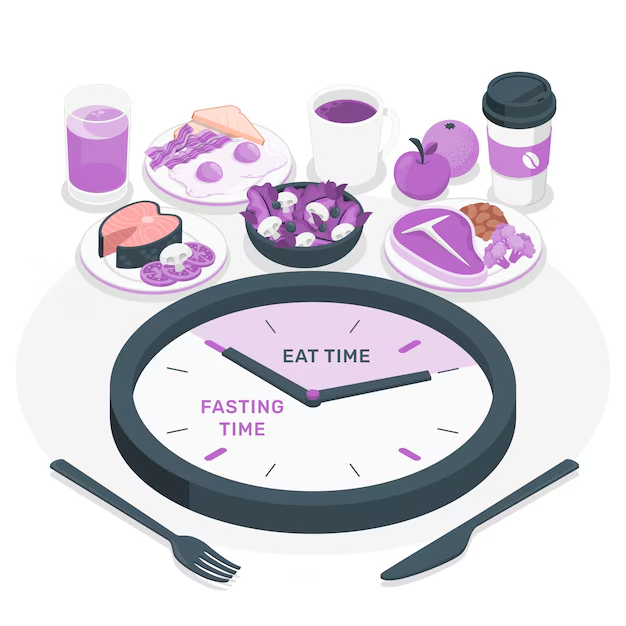Discover the power of fasting , its health benefits, types, weight loss impact, scientific backing, and how to fast safely. A complete guide for beginners and health enthusiasts.
Fasting: A Powerful Health Tool Backed by Science
Fasting is more than a wellness trend, it’s a scientifically backed lifestyle that offers a myriad of health benefits. From improving metabolism to supporting longevity, fasting has become a go-to approach for people looking to lead healthier lives.
But what exactly is fasting, and how can you do it right?Let’s dive into this comprehensive guide.
What is Fasting?
Fasting refers to voluntarily refraining from eating food (and sometimes drinks) for a set period. It has been practiced for centuries for religious, cultural, and therapeutic reasons.
Today, time-restricted eating and intermittent fasting have emerged as popular methods to enhance physical and mental well-being.
Types of Fasting
1. Intermittent Fasting (IF)
Most Popular Type. Eating is restricted to a specific time window (e.g., 16:8, 18:6).
Example: Fast for 16 hours, eat during an 8-hour window.
2. Alternate-Day Fasting (ADF)
Fasting every other day. On fasting days, calorie intake is minimal (~500 kcal).
3. 24-Hour Fasting
No food for 24 hours, once or twice a week. Also called the eat-stop-eat method.
4. 5:2 Diet
Eat normally for 5 days, restrict calories (500–600) for 2 non-consecutive days.
5. Extended Fasting
Fasting for 36 to 72 hours or more. Requires medical supervision.
Science-Backed Benefits of Fasting
1.Fasting for Weight Loss
Fasting helps reduce calorie intake, improves insulin sensitivity, supports fat burning, and triggers ketosis.
2.Improved Metabolism
Boosts growth hormone levels and helps burn fat. Decreases insulin resistance, lowering the risk of Type 2 Diabetes.
3.Cellular Repair and Detoxification
Fasting activates autophagy, a cell cleansing process. Damaged cells are cleared, promoting regeneration.
4.Better Heart Health
Fasting reduces LDL cholesterol, blood pressure, and inflammatory markers.
5.Enhanced Brain Function
Increases BDNF (Brain-Derived Neurotrophic Factor), supports memory, and reduces the risk of neurodegenerative diseases.
6.Longevity and Anti-Aging
Studies show calorie restriction and fasting may extend lifespan by reducing oxidative stress and inflammation.
Fasting triggers a natural healing process in the body. It boosts autophagy-cellular cleanup-enhances insulin sensitivity, and helps regulate cholesterol levels. During fasting, the body burns stored fat for energy, improving metabolism and reducing inflammation. Several studies link intermittent fasting to lower risk of chronic diseases, improved brain health, and increased longevity.
Hence, fasting has an health as well as spiritual aspect making it super beneficial.
What Happens to Your Body During Fasting?

∆ 0–4 Hours: Digestive system processes food; insulin levels rise.
∆ 4–16 Hours: Blood sugar drops; body uses glycogen for energy.
∆ 16–24 Hours: Fat breakdown begins, ketones increase.
∆ 24+ Hours: Autophagy starts, insulin drops drastically, HGH rises.
Who Should Not Fast?
Fasting is generally safe, but certain individuals should consult a doctor first:
• Pregnant or breastfeeding women
• Diabetics on insulin
• Individuals with eating disorders
• People on chronic medications
• Underweight individuals
Tips to Start Fasting Safely
• Start gradually with 12:12 before 16:8
• Stay hydrated – water, herbal teas, black coffee allowed
• Eat nutrient-dense meals during eating windows
• Avoid binge eating post-fast
• Listen to your body and adjust accordingly
• Plan meals ahead of time
Fasting vs. Dieting – What’s the Difference?
Dieting focuses on what you eat; fasting focuses on when you eat.
Fasting is often more sustainable and can be paired with other diets like keto or low-carb eating.
Popular Myths About Fasting – Busted
1. Myth: Fasting starves your body and slows down metabolism.
Reality: This is a common misconception. In fact, short-term fasting has been shown to boost metabolic rate temporarily due to increased levels of norepinephrine. It helps your body become more efficient at burning fat, not storing it.
2. Myth: You will lose muscle mass during fasting.
Reality: When done correctly, intermittent fasting promotes fat loss while preserving lean muscle mass, especially if you maintain adequate protein intake and engage in strength training.
3. Myth: Fasting leads to nutrient deficiency.
Reality: Fasting does not mean skipping nutrients, it’s about timing your meals, not eliminating them. As long as you eat a balanced diet during your eating window, you can meet all nutritional requirements.
4. Myth: Fasting causes fatigue and weakness.
Reality: While some people experience mild fatigue initially, the body adapts over time and most individuals report increased energy, better focus, and improved mental clarity as their bodies shift into fat-burning mode.
5. Myth: Fasting is unsafe for women.
Reality: Fasting can be safe for women, but hormonal sensitivity varies, and it’s important for women to listen to their bodies. Modified fasting approaches like 14:10 instead of 16:8 often work better for some women.
6. Myth: You need to fast for long hours to see benefits.
Reality: Even short fasting windows like 12-14 hours can offer health benefits such as improved digestion, better sleep, and blood sugar regulation. The key is consistency and what you consume during eating hours.
FAQs (Frequently Asked Questions)
Q1: Can I work out during fasting?
Yes, especially low-intensity workouts. Fasted cardio may burn more fat.
Q2: Can I drink water during fasting?
Yes. Water, black coffee, green tea, and herbal teas are allowed.
Q3: Will fasting cause low blood sugar?
Only if you’re diabetic or have underlying conditions. Healthy individuals adapt well.
Q4: Can fasting help in PCOS or hormonal issues?
Yes, studies show intermittent fasting helps regulate insulin and hormonal balance.
Q5: Is fasting safe for teenagers or elderly?
Not recommended unless under medical guidance. Focus on balanced eating instead.
Fasting is a powerful, scientifically backed approach to improve health, lose weight, detox naturally, and even enhance longevity. Whether you’re just starting or looking to optimize your fasting lifestyle, remember to choose a plan that suits your body and schedule.
Simplicity, consistency, and nourishment are key to successful fasting. As a timeless health practice, it’s a sustainable wellness tool, not a quick fix.


